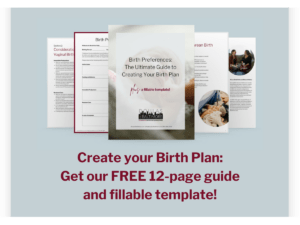We spend nine months getting ready for baby to arrive–both physically and emotionally. But the actual birth experience portion of your journey is relatively short. After birth, your body continues to change for many months. Here are some of the changes you can expect in the moments, weeks, and months after birth.
What will I experience immediately after birth?
Immediately after birth, a care provider may place baby directly on your chest. This skin-to-skin contact helps regulate baby’s body temperature and calms baby. But it can also help your uterus contract to reduce bleeding. Bleeding may still be taking place from where the placenta was attached to the uterus or from any tears. A care provider might provide medication to slow or stop that bleeding, perform a uterine massage, or stitch the perineum. You might also shake, have contractions, feel weak, or be sore (you did just work very hard).
How long does it take to recover from childbirth?
How long it takes to physically recover from childbirth depends on what happened during birth as well as the birthing person’s activity level. If you had tearing, an episiotomy, excessive blood loss, or a cesarean birth, it may take you longer to recover. In the days and weeks following birth, your body will feel different. You may be exhausted, bloated, and sore. The change in hormones can cause mood swings, sweating or hair loss. Pregnancy and childbirth also stretches ligaments and muscles, so your abdominal and pelvic floor muscles take time to tighten back up. If you had a c-section, remember that it is major surgery. You shouldn’t lift or over-exert yourself. Take the time you need to recover, listen to your body and be gentle with yourself
What are the emotional changes I’ll experience after birth?
Our brains are a part of our bodies, and the physical changes to our brains can alter our emotions. The change in hormones that happens in the postpartum period can make you feel happy, excited, positive, overwhelmed, sad, possessive, or disappointed. These are all normal. Making a plan for how family and friends (link to last blow) can help reduce stress. Prolonged and severe depression can also happen after childbirth, and if you (or your support network) are worried about a Postpartum Mood Disorder (PMDD) or Post-traumatic Stress Disorder (PTSD), talk to your care provider.
What physical changes are not normal?
If you have any physical or emotional changes that concern you, talk to your care provider. They can help you determine what is normal and what isn’t. You should also talk to your care provider if you have vomiting, flu-like symptoms, fever, heavy bleeding, difficulty urinating, leg pain, vaginal itching, dizziness, shortness of breath, or racing heart.
Can I recover more quickly after childbirth?
The most important thing to do after giving birth is listen to your care provider. They can help you understand what you went through and how long it will take to recover. Make sure you prioritize your needs for rest, nutrition, and mental health. Many women feel physically recovered from childbirth around 6 weeks, but for most, it may take longer.
A postpartum doula can provide education and support, and assist with newborn care, breastfeeding support, or anything else that can help ease the transition when a new baby arrives.






